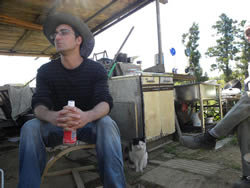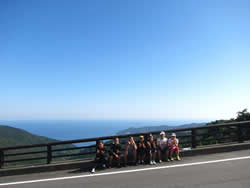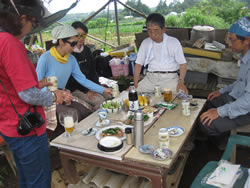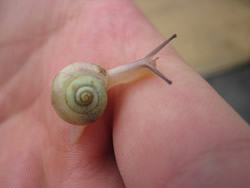- Home » Expat Articles » Interviews » American Expat Living in Japan, Expat Interview with Misha
American Expat Living in Japan, Expat Interview with Misha
| Published: | 21 Oct at 12 PM |
Want to get involved?
Become a Featured Expat and take our interview.
Become a Local Expert and contribute articles.
Get in touch today!
Become a Local Expert and contribute articles.
Get in touch today!
Filed: Interviews,Japan
Misha is an American who is living, cooking, and teaching English in Japan. He spends his days jumping in rivers, hiking mountains, and cooking like a madman. His nights are spent slaying the mike in karaoke bars, finding great food, and searching for people crazy enough to want to hang out with him. With a myriad of delicious ingredients at his fingertips, he does his best to keep his belly full, his wallet fat, and his friends impressed. Misha's expat blog is called The poor man's kitchen (see listing here)
Where are you originally from?
I’m originally from the United States of America. I was born in Shawnee Mission, Kansas and raised in St. Louis, Missouri.
In which country and city are you living now?
I am currently living and working in Japan. I live in a little town called Nitta just outside the city of Mishima, on the Izu Peninsula.
How long have you lived in Japan and how long are you planning to stay?
I’ve lived here for about a year and half now. I have family back home, so I’m not exactly certain how long I’m planning on staying here. I will probably stay here until I’m rich or until I get tired of being away from my family. Whichever comes first.
Why did you move to Japan and what do you do?
I moved to Japan because I love the culture, the language, and the food. I do what most people who come to Japan just after graduating college do: teach English. I teach three different elementary schools and nine different kindergartens in the area, which means I’m a busy man with almost two thousand adorable students.
Did you bring family with you?
I’m still too young to be a married man, so I came to Japan all by myself. Living in a tiny apartment by yourself can be a little lonely at times, but I live a pretty fulfilling life for a bachelor. Besides, I love to host visitors, so I have friends stopping in for a few days all the time.
How did you find the transition to living in a foreign country?
Honestly, culture shock wasn’t very shocking at all. I love it here, and it helps that I live in one of the most beautiful places in the world (in my humble opinion). The people of Izu, especially those in the rural communities I frequent, are kind, honest, and appreciative of nature. Suffice to say, I blend right in.
Was it easy making friends and meeting people; do you mainly socialize with other expats?
I have been told that I am a rare breed of expat in Japan. I do everything within my power to do very little exclusively expat socializing. I am of the belief that, while I am in Japan, I should do my best to make Japanese friends and interact with extraordinary and unique Japanese people. Some of my best friends here are farmers, restaurant owners, bartenders, and school teachers. And through them, I have learned so much more about Japan than a textbook could ever teach me.
What are the best things to do in the area; anything to recommend to future expats?
First and foremost, eat fish whenever you can. My area has some of the freshest and the best tasting fish, and if you find a restaurant which can prepare them well, you need not eat elsewhere. Next, the mountains. Oh boy, the mountains are amazing. I live in a valley surrounded on all sides by them. I see Mount Fuji every day when I walk out my front door. Last, the Japanese-style hot springs (onsen in Japanese). The Izu Peninsula has some of the cheapest and most beautiful onsen in all of Japan.
What do you enjoy most about living hin Japan?
Izu is particularly perfect for me as a foodie who also loves and appreciates nature. I love the taste of the food here, but more importantly I love the care and concern put into its preparation. I’ve been to a few restaurants in which I was given delicious, beautifully prepared seafood free of charge. When I asked why, I was told that if the fish was prepared the next day, it wouldn’t have tasted the best it possibly could. Ingredients aren’t just used, they are respected.
How does the cost of living compare to home?
On the whole, Japan is more expensive. Living spaces are smaller, utilities are a little pricey, and eating out can cost a pretty penny, which is precisely the reason I decided to start my blog. A foreigner in Japan can eat well and live a fulfilling life with very little money. All it takes is a little bit of know-how, some elbow grease, and a boatload of motivation.
What negatives, if any, are there to living here?
There are two commonly found varieties of cheese in Japan: “melty cheese,” and string cheese. Guess how much real cheese is in them? If you guessed zero percent, you are correct.
If you could pick one piece of advice to anyone moving here, what would it be?
First, keep an open mind. Don’t assume Tokyo is where all the fun is. What I call the “real Japan” is waiting for you in the mom and pop ramen shops dotting the countryside, the 120 year old sushi establishments, and the rivers full of middle aged salary-men fishing on the weekends. Second, get to know your surroundings. My town, despite being rural, has so many amazing places nearby that have never even been mentioned in a tourism pamphlet. Even in the middle of nowhere, something amazing is waiting for you somewhere, and it is your responsibility to find it.
What has been the hardest aspect to your expat experience so far?
That would be the cultural restrictions. I live in Japan, I speak Japanese, and I am a diehard observer of Japanese cultural traditions. But I will never be Japanese. Japan has an extremely rigorous conception of what constitutes “Japanese” and what constitutes “everybody else.” It isn’t my place to change such beliefs, so the hardest part has been coming to grips with them and embracing my innate foreignness. In short, learning when to blend and when to shine has been the hardest part of living in Japan.
When you finally return home, how do you think you'll cope with repatriation?
When I decide to head home to the States, I will be a stronger, smarter, better, more independent human being. Not because of Japan per se, but because by living in another country (especially by myself) and observing their cultural mores, I have widened my perspective. My experiences abroad have taught me how to better empathize with people who are profoundly different from myself.
What are your top 5 expat tips for anyone following in your footsteps?
Tell us a bit about your own expat blog.
The Poor Man’s Kitchen is a cooking blog dedicated to keeping your stomach full, your wallet fat, and all your friends impressed. It contains lots of tasty recipes, my musings on Japan, odes to some of the amazing people I have met in my life, and some snarky jokes here and there. The motto of my blog is “live like a peasant, eat like a king,” so you won’t find black truffle, fois gras, or filet mignon in my recipes. The goal of PMK is to embody the balance between eating rich, delicious food and living responsibly within your means.
How can you be contacted for further advice to future expats coming to your area?
I can always be reached via Twitter and Facebook, and on the comments section of the Poor Man’s Kitchen.
Here's the interview with Misha...
Where are you originally from?
I’m originally from the United States of America. I was born in Shawnee Mission, Kansas and raised in St. Louis, Missouri.
In which country and city are you living now?
I am currently living and working in Japan. I live in a little town called Nitta just outside the city of Mishima, on the Izu Peninsula.
How long have you lived in Japan and how long are you planning to stay?
I’ve lived here for about a year and half now. I have family back home, so I’m not exactly certain how long I’m planning on staying here. I will probably stay here until I’m rich or until I get tired of being away from my family. Whichever comes first.
Why did you move to Japan and what do you do?
I moved to Japan because I love the culture, the language, and the food. I do what most people who come to Japan just after graduating college do: teach English. I teach three different elementary schools and nine different kindergartens in the area, which means I’m a busy man with almost two thousand adorable students.
Did you bring family with you?
I’m still too young to be a married man, so I came to Japan all by myself. Living in a tiny apartment by yourself can be a little lonely at times, but I live a pretty fulfilling life for a bachelor. Besides, I love to host visitors, so I have friends stopping in for a few days all the time.
How did you find the transition to living in a foreign country?
Honestly, culture shock wasn’t very shocking at all. I love it here, and it helps that I live in one of the most beautiful places in the world (in my humble opinion). The people of Izu, especially those in the rural communities I frequent, are kind, honest, and appreciative of nature. Suffice to say, I blend right in.
Was it easy making friends and meeting people; do you mainly socialize with other expats?
I have been told that I am a rare breed of expat in Japan. I do everything within my power to do very little exclusively expat socializing. I am of the belief that, while I am in Japan, I should do my best to make Japanese friends and interact with extraordinary and unique Japanese people. Some of my best friends here are farmers, restaurant owners, bartenders, and school teachers. And through them, I have learned so much more about Japan than a textbook could ever teach me.
What are the best things to do in the area; anything to recommend to future expats?
First and foremost, eat fish whenever you can. My area has some of the freshest and the best tasting fish, and if you find a restaurant which can prepare them well, you need not eat elsewhere. Next, the mountains. Oh boy, the mountains are amazing. I live in a valley surrounded on all sides by them. I see Mount Fuji every day when I walk out my front door. Last, the Japanese-style hot springs (onsen in Japanese). The Izu Peninsula has some of the cheapest and most beautiful onsen in all of Japan.
What do you enjoy most about living hin Japan?
Izu is particularly perfect for me as a foodie who also loves and appreciates nature. I love the taste of the food here, but more importantly I love the care and concern put into its preparation. I’ve been to a few restaurants in which I was given delicious, beautifully prepared seafood free of charge. When I asked why, I was told that if the fish was prepared the next day, it wouldn’t have tasted the best it possibly could. Ingredients aren’t just used, they are respected.
How does the cost of living compare to home?
On the whole, Japan is more expensive. Living spaces are smaller, utilities are a little pricey, and eating out can cost a pretty penny, which is precisely the reason I decided to start my blog. A foreigner in Japan can eat well and live a fulfilling life with very little money. All it takes is a little bit of know-how, some elbow grease, and a boatload of motivation.
What negatives, if any, are there to living here?
There are two commonly found varieties of cheese in Japan: “melty cheese,” and string cheese. Guess how much real cheese is in them? If you guessed zero percent, you are correct.
If you could pick one piece of advice to anyone moving here, what would it be?
First, keep an open mind. Don’t assume Tokyo is where all the fun is. What I call the “real Japan” is waiting for you in the mom and pop ramen shops dotting the countryside, the 120 year old sushi establishments, and the rivers full of middle aged salary-men fishing on the weekends. Second, get to know your surroundings. My town, despite being rural, has so many amazing places nearby that have never even been mentioned in a tourism pamphlet. Even in the middle of nowhere, something amazing is waiting for you somewhere, and it is your responsibility to find it.
What has been the hardest aspect to your expat experience so far?
That would be the cultural restrictions. I live in Japan, I speak Japanese, and I am a diehard observer of Japanese cultural traditions. But I will never be Japanese. Japan has an extremely rigorous conception of what constitutes “Japanese” and what constitutes “everybody else.” It isn’t my place to change such beliefs, so the hardest part has been coming to grips with them and embracing my innate foreignness. In short, learning when to blend and when to shine has been the hardest part of living in Japan.
When you finally return home, how do you think you'll cope with repatriation?
When I decide to head home to the States, I will be a stronger, smarter, better, more independent human being. Not because of Japan per se, but because by living in another country (especially by myself) and observing their cultural mores, I have widened my perspective. My experiences abroad have taught me how to better empathize with people who are profoundly different from myself.
What are your top 5 expat tips for anyone following in your footsteps?
- Cook and move. Cooking and physical fitness are forms of cartharsis which can make all the difference in your life.
- Screw up. The information you learned from books in your lifetime pales in comparison to the learning you have done my making mistakes over and over. Mistakes are how we learn permanent lessons.
- Know your job, and know your passion. Some people are lucky and they end up being the same thing, but they don’t have to be. Do you job with gusto and be good at it, but remember that at the end of the day your passion is waiting to recharge you.
- Tell fatigue to take a hike. After a long day of work, deciding to do something low key is easy. But amazing stories never start with “taking it easy.” They start with you leaving the home exhausted after a long day of work and making the best of every minute of the day remaining.
- Try not to see the forest for the trees sometimes. Take your life one tiny step at a time. Appreciate that dragonfly who just buzzed by, or the taste of an orange, or the smell of the seasons. Finding joy in insignificant things is the fastest and easiest way to be happy every day.
Tell us a bit about your own expat blog.
The Poor Man’s Kitchen is a cooking blog dedicated to keeping your stomach full, your wallet fat, and all your friends impressed. It contains lots of tasty recipes, my musings on Japan, odes to some of the amazing people I have met in my life, and some snarky jokes here and there. The motto of my blog is “live like a peasant, eat like a king,” so you won’t find black truffle, fois gras, or filet mignon in my recipes. The goal of PMK is to embody the balance between eating rich, delicious food and living responsibly within your means.
How can you be contacted for further advice to future expats coming to your area?
I can always be reached via Twitter and Facebook, and on the comments section of the Poor Man’s Kitchen.
Grab a featured expat badge that links to this interview!
 Copy and paste code to display the Featured Expat Badge:
Copy and paste code to display the Featured Expat Badge:Comments » No published comments just yet for this article...
Feel free to have your say on this item. Go on... be the first!





 Misha is an American expat living in Japan. Blog description: i'm just a guy living in japan, teaching english, and cooking up a storm. the poor man's kitchen is a blog dedicated to the art of making beautiful food for less money.
Misha is an American expat living in Japan. Blog description: i'm just a guy living in japan, teaching english, and cooking up a storm. the poor man's kitchen is a blog dedicated to the art of making beautiful food for less money.





